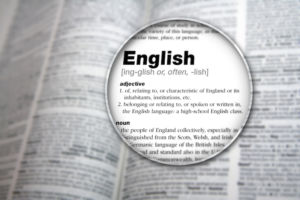Your customers are real people, with busy lives. When communicating with them you should be concise, useful and authentic.
There’s nothing worse than corporate communications full of business jargon. If you look at it from a customer point of view, you will quickly discard all those ‘blue sky thinking’ and ‘going forwards’ phrases that mean little to those outside your business.
Jargon can be useful when you are writing for people in your business. However, few customers will understand it, and far more will be irritated by it. (Read this article for the worst offenders).
In broadcaster John Murray’s book on the subject, Now That’s What I Call Jargon, he wrote:
‘Small companies vying for business in a small market like Ireland believe their chances of winning customers will be enhanced if they present their skills and talents in a language one or two notches above normal human discourse. The business that some of them do drum up just goes to prove the theory that you CAN fool some of the people all of the time’.
While Murray pokes fun at the worst excesses of businesses and organisations, there is a serious point to it too. According to the National Adult Literacy Agency, more than 70% of people find it difficult to understand even basic application forms.

Damaging your business
Jargon can hurt your business or make you appear foolish. If a person cannot read your website or related marketing material, then they are unlikely to become a customer.
Take a look at what one alcohol industry professional wrote in a statement about binge drinking: “A real, embedded and strategic commitment to responsible behaviour, even if it appears superficially counter to a business’s commercial interests, is actually a critical business enabler in the modern world of stakeholder advocacy.”
Avoid clichés, too. They rarely get your point across better than simple English. Remember, the customer hates to read gobbledygook, so clean up those sentences that avoid the point or obscure its meaning.
What to avoid
While all jargon should be avoided, here are eight common examples to steer clear from when writing to your customers or preparing promotional material.
- Legalisms: Don’t use words like aforesaid, hereby, heretofore and notwithstanding. Use everyday English as much as possible.
- Stock phrases: Use simple, direct expressions, such as the examples used in the following table:
| Avoid | Use |
| I’m writing in relation to | I’m writing about |
| Further to your enquiry | I am writing about your enquiry |
| If I can be of further assistance | If there’s anything else I can do to help |
| At your earliest convenience | As soon as you can |
| Please do not hesitate to contact us | Please let us know |
- Acronyms: Keep these to a minimum, and don’t use them at all unless you explain them first. The likes of ‘SMART-goals’ and ‘WYSIWYG’ come across as nonsense if you don’t know what they mean. The IT sector is particularly prone to this.
- Latin or other languages: Use English. Even if they are used commonly, there’s a better phrase, understood by everybody, for modus operandi, inter alia, per annum and per diem. Some customers may find this irritating or off-putting.
- Slang: Keep your writing polite. Avoid offensive or inappropriate terms, slang or text speak such as ‘ROFL’ or ‘TMI’. Don’t write slang in content targeted at young people, as it will come across as a lame attempt to ingratiate. Young people use slang within their age groups, and they don’t want to hear or read it anywhere else.
- Quotations: Be direct. You don’t need to waffle away with hoary old phrases such as ‘Rome wasn’t built in a day’, ‘a rose by any other name’ or ‘necessity is the mother of invention’.
- Technical information: Some of this may be unavoidable, but ensure you write it in a way that is understood by a customer with little or no knowledge of the subject. If you have to explain a technical process, write in the active voice and use short, clear sentences.
- Trendy phrases: Jargon is constantly evolving, and new words are always being introduced into daily use. You should keep on top of words that are currently in vogue, such as ‘deceptionist’, ‘Xoogler’ or ‘fauxtrepreneur’.
5 Action Points





